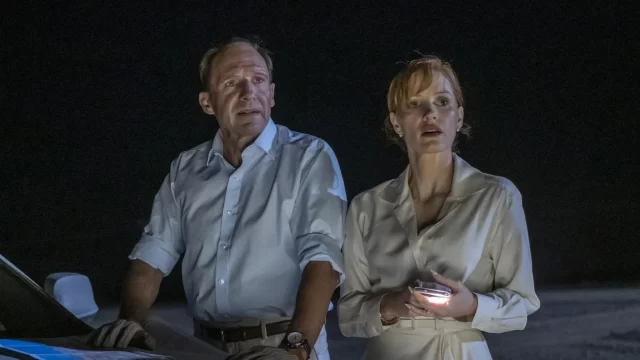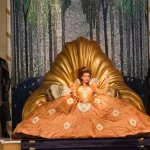The Forgiven: Sins and Virtues, by David Bax

John Michael McDonagh’s The Forgiven (adapted by the director from Lawrence Osborne’s novel) might take the scenic route getting there but it eventually reveals itself to be a film in the grand tradition of the “house in the country” movie. Think The Rules of the Game or Gosford Park. Except, in this case, the house is more of a villa and the countryside is actually the Moroccan Sahara. And, instead of following the Agatha Christie playbook where the inciting incident happens only once all the players are gathered, The Forgiven‘s plot kicks off before the weekend’s festivities have even gotten underway, when a married couple, David and Jo Henninger (Ralph Fiennes and Jessica Chastain), strike and kill a Moroccan teenage boy (Omar Ghazaoui) on the road to the party.
As is usually the case in these kinds of movies, the partygoers are all fabulously rich; one close-up of David’s leather driving gloves is all the information we need to understand that. So the allegorical implications about the effect wealthy Westerners have on native residents of developing countries is plain. Too plain, in fact, for an aggressive filmmaker like McDonagh. Still, he gets plenty of digs in at his well-heeled characters; one of the things at which The Forgiven is most adept at illustrating is just how insufferable it is to listen to rich people talk about politics that only affect them in the abstract.
But again, McDonagh is too vicious a director to settle for taking potshots. He wants to challenge expectations, a goal made clear by the opening titles, which present the credits all out of the usual order (I couldn’t help but wonder how many of agents and managers had to sign off on that).
There are viewers who will find McDonagh’s button-pushing exhausting and show-offy after the umpteenth instance of some upscale drunkard being drolly insensitive and impolitic. I can’t blame them but I’ve long enjoyed the mannered, almost theatrical sardonicism displayed by his characters in movies like The Guard and Calvary (the latter being a personal favorite). There can be a certain charm in arrogance that isn’t rooted in insecurity.
That’s because, without insecurity, there’s little impulse to pass judgment. As blithely cruel and ignorant as some of McDonagh’s characters can be, his secret weapon is that he doesn’t hate them. On the contrary, there is humanity to be found in all of them. This is especially true of the weekend’s hosts, Richard and Dally (Matt Smith and Caleb Landry Jones), who appear at first to be homophobic stereotypes of affluent, amoral gays but who may end up being the most inherently decent of the revelers. And even as we watch David try to avoid any serious consequences for taking a boy’s life, we come to know what and how much he feels.
Those consequences still must be paid, of course. The Forgiven takes an intensely old school Catholic view of the world–one it shares with Calvary–in which transgression and retribution are harmonious, balancing forces. One is not fulfilled without the other. With that in mind, you can expect a satisfying ending from McDonagh but not a happy one.





























